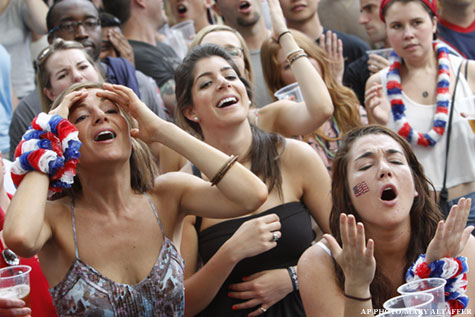Many believe the most powerful people in sports are the league commissioners, network
executives, sports agents, or those controlling advertising and sponsorship dollars. But, in reality,
it is you.
The fans possess absolute power. That’s right, it’s those standing shirtless in the snow, with
freshly painted faces and the home team’s name scrawled across their chests, watching intently
as their team drives for the winning score that are in charge. When and whether fans choose to
wield their power is another story.
The sports business industry not only understands just how unbelievably and reliably tolerant
fans are, but it also parlays their emotional attachment to sell related products and services.
Think about it: Fans actually pay upwards of $100 to purchase a jersey in order to tell the
world that they support (revere?) the team’s recently acquired $100 million ballplayer … often
regardless of the player’s off-field problems.

These same fans are essentially responsible for what they perceive to be wrong with sports
because they never materially change their spending or consumption patterns. They don’t vote
with their feet often enough by balking at high-priced game-day experiences, and they certainly
don’t vote via remote control by tuning away from televised sports. Put down the sports app-
laden iPhone and pick up a copy of The Big Short? Not while The Big Game is on. Or a fantasy
roster needs updating. Or SportsCenter is on. Then again, as compelling as sports can be to
watch, whether in person or from the comfort of home via a 65-inch flat screen, who can really
blame them?
So even if an anemic economy and high-priced tickets and concessions chase fans from the
stadium to their couches, the sports industry remains able to profit from them given that the
revenue linked to broadcast and cable TV is the lifeblood for many leagues and teams; the NFL
alone generates about $4 billion a year from its broadcasts, and this amount is sure to increase.
[Related: World's highest-paid sports teams]
[Related: Which team's fans are the best?]
[Related: Forbes' list of best-dressed athletes]
[Related: Most expensive championship trophies]
Sports are, or at the very least should be, about the fans and their connection to their favorite
players and hometown teams. This is also true of sports business, where anyone hoping to
profit from sports must appreciate –- and then carefully lever –- the fact that fans live vicariously
through their star athletes and beloved franchises. Some even die vicariously through their
favorite teams as evidenced by the licensing of sports-themed caskets, which cost just a few
hundred dollars more than their traditional “non-sports” (secular?) counterparts.
Substantial profiting from the emotional attachment fans have to sports can only occur when
these fans, called customers in every other business setting, receive adequate customer service.
Sports entities and organizations that fail to deliver requisite levels of customer service, as
determined solely by fans who wield the ultimate influence, severely limit their ability to
generate revenue and build franchise/shareholder value.
Those who argue that the sports industry delivers poor customer service -- as evidenced by
strikes and lockouts, players testifying in front of Congress, and TV networks determining
when games should take place -- are simply misguided. None of these developments have ever
sufficiently discouraged fans from spending on sports.
It’s precisely because fans remain such loyal customers despite their concerns that the sports
industry continues to prosper. In fact, whenever something goes awry in sports (at least in the
eyes of the fans), fans need look no further than the mirror, as they are the ones stoking what
has become a $400 billion a year industry. After all, it is because of their insatiable demand for
sports that the sports industry supplies its product 24/7.
If fans/customers were truly put off by certain elements of the industry as they routinely
posture about, they would demand action; they would mandate change – they would insist upon
improved customer service. Instead, fans host bonfires for the express purpose of burning, in
effigy, players, coaches, and owners who they believe have wronged them and the city they
represent. Days later, these same fans host elaborate tailgate parties in an effort to prepare for
that important divisional match-up.
So, in reality, they are being heard, loud and clear, by all those that seek to make money on them.
Except their boos come through as loud cheers.
So the next time you hear someone complaining in a ballpark concession line about the price
of that $10 domestic beer (as I all too regularly do) just remember -– they chose to get in line,
often more than once. So they should enjoy that high-priced cold one and toast the fact that they
are largely responsible for its price. But wait, what would a ball game be without a cold beer,
regardless of its price? The answer to this question may not be worth knowing … and everyone in
sports knows it.
-- David M. Carter is principal of the Sports Business Group and serves as the executive director
of the USC Marshall Sports Business Institute. His most recent book, “Money Games,” is now available.
Other popular stories on the Yahoo! network:
• Golden-voiced homeless man going to rehab
• Football star goes from wide receiver to federal agent
• Brett Favre's sister arrested in meth bust




